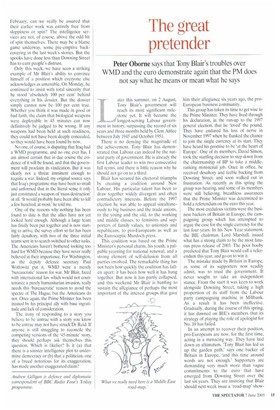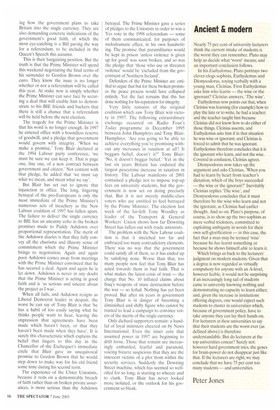The great
pretender Peter Oborne says that Tony Blair's troubles over WMD and the euro demonstrate again that the PM does not say what he means or mean what he says
ater this summer, on 2 August, Tony Blair's government will reach its most significant milestone yet. It will become the longest-serving Labour govern ment in history, surpassing the record of six years and three months held by Clem Attlee between July 1945 and October 1951.
There is no denying the magnitude of the achievement. Tony Blair has demonstrated that Labour can indeed be the natural party of government. He is already the first Labour leader to win two consecutive full terms, and there is little reason why he should not go on to a third.
Blair has secured his electoral triumphs by creating a coalition around New Labour. His particular talent has been to draw together widely divergent and often contradictory interests. Before the 1997 election he was able to appeal simultaneously to big business and the trade unions, to the young and the old, to the working and middle classes, to feminists and supporters of family values, to unionists and republicans, to pro-Europeans as well as the Eurosceptic Murdoch press.
This coalition was based on the Prime Minister's personal charm, his youth, a palpable yearning for national renewal, and a strong element of self-delusion from all parties involved. The remarkable thing has not been how quickly the coalition has fallen apart; it has been how well it has hung together. But now it has partly collapsed, and this weekend Mr Blair is battling to sustain the allegiance of perhaps the most important of the interest groups that gave
him their allegiance six years ago, the proEuropean business community.
This group has taken its time to get wise to the Prime Minister. They have lived through his declaration, in the run-up to the 1997 general election, that he 'loved' the pound. They have endured his loss of nerve in November 1997 when he flunked the chance to join the single currency at its start. They have heard his promise to be 'at the heart of Europe'. One of its members, David Simon, took the startling decision to step down from the chairmanship of BP to take a middleranking ministerial job. Once in office, he received desultory and feeble backing from Downing Street, and soon walked out in frustration. As recently as this spring the group was bearing, and some of its members were still believing, breathless assurances that the Prime Minister was determined to hold a referendum on the euro this year.
The most credulous victims were the business backers of Britain in Europe, the cam paigning group which has attempted to argue the case for the single currency for the last four years. In his New Year statement, the BIE chairman, Lord Marshall, issued what has a strong claim to be the most fatuous press release of 2003. The poor booby predicted that Tony Blair would call a referendum this year, and go on to win it.
The mistake made by Britain in Europe, as some of its supporters now readily admit, was to trust the government. It never sought to take an independent stance. From the start it was keen to work alongside Downing Street, taking a high proportion of its staff from the Labour party campaigning machine in Millbank.
As a result it has been ineffective. Gradually, during the course of this spring, it has dawned on BIE's members that its strategy of playing the role of apologist for No. 10 has failed.
In an attempt to recover their position, pro-Europeans are now, for the first time, acting in a menacing way. They have laid down an ultimatum. 'Tony Blair has led us up the garden path,' says one backer of Britain in Europe, 'and this time around words are not enough.' Supporters are demanding very much more than vague commitments to the euro that have emerged from Downing Street over the last six years. They are insisting that Blair should next week issue a 'road-map' show ing how the government plans to take Britain into the single currency. They are also demanding concrete indications of the government's good faith, of which the most eye-catching is a Bill paving the way for a referendum, to be included in the Queen's Speech this autumn.
This is their bargaining position. But the truth is that the Prime Minister will spend this weekend negotiating the final terms of his surrender to Gordon Brown over the euro. They know the issue is no longer whether or not a referendum will be called this year. At stake now is simply whether the Prime Minister can save face by securing a deal that will enable him to demonstrate to his BIE friends and backers that there is still a chance that a referendum will be held before the next election.
The tragedy for the Prime Minister is that his word is no longer enough. In 1997 he entered office with a boundless reserve of goodwill, and a pledge that government would govern with integrity. 'When we make a promise,' Tony Blair declared at the 1994 Labour party conference, 'we must be sure we can keep it. That is page one, line one, of a new contract between government and citizen.' Not content with that pledge, he added that 'we must say what we mean, and mean what we say'.
But Blair has set out to ignore that injunction in office. The long, lingering betrayal of the pro-Europeans is only the most immediate of the Prime Minister's numerous acts of treachery as the New Labour coalition of 1997 has fallen apart. The failure to deliver the single currency to BIE has an uncanny echo in the broken promises made to Paddy Ashdown over proportional representation. The merit of the Ashdown diaries is that they fully convey all the charisma and illusory sense of commitment which the Prime Minister brings to negotiation. Again and again poor Ashdown comes away from meetings with the Prime Minister convinced that he has secured a deal. Again and again he is let down. Ashdown is never in any doubt that the Prime Minister is acting in good faith and is 'as serious and sincere about the project as I was'.
When all fails, and Ashdown resigns as Liberal Democrat leader in despair, the worst he can say of Tony Blair is that 'he has a habit of too easily saying what he thinks people want to hear, leaving the impression that agreements have been made which haven't been, or that they haven't been made when they have'. It is surely this characteristic which explains the belief that lingers to this day in the Chancellor of the Exchequer's immediate circle that Blair gave an unequivocal promise to Gordon Brown that he would step down to make way for his old friend some time during his second term.
The experience of the Ulster Unionists, because it rests on a demonstrable breach of faith rather than on broken private assurances, is more serious than the Ashdown betrayal. The Prime Minister gave a series of pledges to the Unionists in order to win a Yes vote in the 1998 referendum — some of them communicated, for purposes of melodramatic effect, in his own handwriting. The promise that paramilitaries would be kept in prison 'unless violence is given up for good' was soon broken, and so was the pledge that 'those who use or threaten violence' would be 'excluded from the government of Northern Ireland'.
Defenders of the Prime Minister are entitled to argue that but for these broken promises the peace process would have collapsed entirely. Yet the fact remains that this has done nothing for his reputation for integrity.
Very little remains of the original coalition which saw Tony Blair win victory in 1997. The following extraordinary exchange occurred on Radio Four's Today programme in December 1995 between John Humphrys and Tony Blair. Humphrys: 'Are you going to be able to achieve everything you're promising without any increases in taxation at all? It beggars belief, doesn't it?' Tony Blair: 'No, it doesn't beggar belief.' Yet in the last six years Britain has endured the largest peacetime increase in taxation in history. The Labour manifesto of 2001 contained a pledge not to impose top-up fees on university students, but the government is now set on doing precisely that. But it is not merely middle-class voters who are entitled to feel betrayed by the Prime Minister. The election last week of the far-left Tony Woodley as leader of the Transport & General Workers' Union shows how far Downing Street has fallen out with trade unionists.
The problem with the New Labour coalition is that it stretched too far and embraced too many contradictory elements. There was no way that the government could satisfy all of them, so it has ended up by satisfying none. Worse than that, too many people now feel that Tony Blair has acted towards them in bad faith. That is what makes the latest crisis of trust — the charge that No. 10 inflated claims about Iraq's weapons of mass destruction before the war — so lethal. Nothing has yet been proved. But after six years in government Tony Blair is in danger of becoming a diminished and shifty figure who cannot be trusted to lead a campaign to convince voters of the merits of the single currency.
Only diehard supporters remain: a handful of loyal ministers cheered on by News International. Even the inner core that assumed power in 1997 are beginning to drift loose. Those that remain are increasingly embattled, fearful and paranoid, voicing bizarre suspicions that they are the innocent victims of a plot from within the security services. Suddenly the Downing Street machine, which has seemed so welloiled for so long, is starting to wheeze and to clank. Tony Blair has never looked more isolated, or the outlook for his government so bleak.











































































 Previous page
Previous page